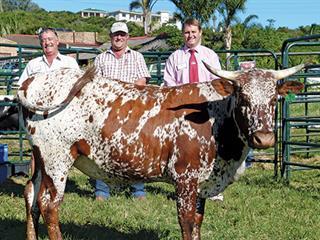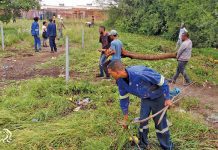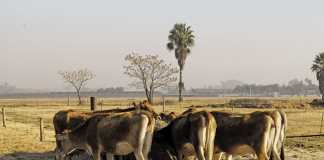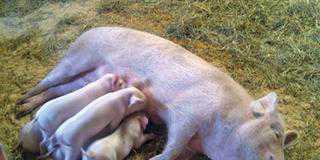
“He has become more than a mentor. He’s a friend and a role model – someone I look up to.” These are the words of emerging Nguni stud breeder Mandange Tyali to describe Pat Hobbs, the highly regarded Eastern Cape Nguni breeder.
It’s a sentiment that is obviously widely shared: Pat was recently named the SA Stud Book-Farmer’s Weekly 2014 Mentor of the Year.
Yet, when asked about his reaction on receiving the award, his modesty was disarming.
“While I appreciate the award, I’m not sure I’m deserving of it,” he says, before listing other farmers in the Eastern Cape’s Komga region who host information days and provide assistance for emerging farmers. I wasn’t looking to win any prizes. I do what I can. In the end the society gains a member and I gain a friend.”
Pat’s willingness to help any new member of the Nguni Breeders’ Society is part of the work ethic he adopted when he first started in the farming industry. After his parents sold the family farm near Cathcart during the creation of the homelands in the late 1970s, Pat was forced to seek work. He started at Eastern Cape Meats – a subsidiary of Vleissentraal seconded to the Ciskei government – and ended up managing a number of cattle farms on the Mpekweni Coast.
A key component of the job was assisting smaller farmers. This ethos was reinforced when he went to work for the South African Development Bank, and has continued ever since. In 1990, he became a council member of the Nguni Breeders’ Society, where training has always been a part of his portfolio. In fact, his willingness to help farmers starting out in the breeders’ society has become so ingrained it’s almost a reflex action, he admits.
Won over by Ngunis
It was during his time on the Mpekweni Coast that Pat developed the keen understanding of the Nguni that he so willingly shares with those he helps. Initially, he was not particularly impressed with the Nguni’s weight relative to other stud breeds. But his respect for the breed grew as he began to notice its resilience in tough conditions.
“During the drought in 1982 and 1983, we were mating about 3 000 cows,” he recalls. “The conception rate of other breeds fell to below 50%, whereas that of the Nguni-type was 80%. And these were on the worst farms. That was when the penny dropped for me.”
Teaching new techniques
Having started out with nothing and today breeding top quality Nguni cattle on leased land, Pat Hobbs is perfectly placed to provide valuable advice based on hard- won personal experience. He has also come to appreciate the benefits of scientific farming and new technology, and encourages emerging farmers to adopt these in their herds.
For example, he supports the quick-rotation, high-density grazing approach, although he is unable to develop the required infrastructure on the grazing he rents. He also employs a multi-sire breeding system – sometimes frowned upon in stud breeding circles – using DNA tests to confirm paternity. Pat strongly encourages emerging farmers to record their herd statistics.
“To make an informed decision, a cattleman must know, and the only way to know is to measure,” he says. “You can gauge certain things with the eye, but there are other things you can’t see with the eye yet need to record.” Pat speaks from experience. By recording specific information about the animals in herd, Pat has indentified certain dam lines that are hardier than others. Consequently, he is paying more attention to dam lines with appropriate sire lines to breed better animals, and encourages those under his guidance to do the same.
Hands-off mentoring
While understanding the benefits and insight gained by measuring and recording specific traits in his own cattle, Pat employs what he calls a “non-interfering approach” to mentoring. “I draw the line between helping and interfering. I won’t farm for these farmers,” he says. “Sometimes it’s important to let them stub their toes because they remember these lessons better.”
He stresses that emerging farmers enjoy the benefits of learning from experience, as this is more easily retained. They also take pride in achieving their own successes, which provides further motivation. Importantly, throughout this learning process, he remains “only a phone call away”.
For this ‘hands-off’ approach to work, the emerging farmer has to have a strong desire to learn, and Pat looks for this before agreeing to mentor a farmer. “I’ll work with anybody who’s passionate about what he does,” he says. “But each farmer sets the pace at which he learns.”
An ongoing friendship
Emerging Nguni farmer Mandange Tyali has certainly been eager to learn. Originally from Elliotdale in the former Transkei, the Tyali family had farmed Ngunis for a long time before Mandange approached Pat for guidance. They first met in Queenstown in 2011 and after Mandange expressed a desire to register the family’s cattle, Pat immediately became involved.
“When I showed an interest in registering our cattle, he told us exactly what we needed to do and was always willing to help when we needed it,” recalls Mandange. “I’ve developed a similar respect for him as I have for my father. Although I don’t need as much help anymore, I still visit Pat to see his animals and chat about how to get our herd to his level.”
With Pat’s help, the Tyalis have registered half of their 280 Ngunis and aim to register the entire herd within the next three years. Their A-Class heifers are now pregnant and the family plans to sell their first registered animals at the 2015 Amathole Nguni Breeders’ production sale.
While the Tyalis have made great strides, they have yet to overcome a major challenge – a shortage of land. They own a 210ha farm near Morgan Bay, which is already overstocked. Unable to rent additional grazing, they have applied to the government for assistance in acquiring further land but have had no response yet. This, in Pat’s view, is a great disappointment, as he believes that Mandange could manage many more cattle than the current farm can stock.
Improving the programme
Pat is nonetheless appreciative of government’s efforts to uplift emerging farmers such as Mandange. He is particularly positive about the Livestock Improvement Programme (LIP). Through the LIP, the Department of Rural Development and Land Reform purchases good quality Nguni animals to pass on to emerging farmers.
“We as a society are very privileged that the Nguni breed has received national interest, and I believe that government has made the right choice,” says Pat. “It can handle harsh, extensive farming conditions well.” At the same time, he believes that the LIP can be improved upon. For example, he emphasises that he has never been approached by government to act as a mentor and all mentorship he has engaged in has been free of charge and at the request of emerging farmers.
“I think there could be more cohesion in the whole system. There’s more buy-in from our [the Nguni Breeders’ Society’s] side,” he says. “I mean, my name is there along with a lot of other members’ names, but I don’t do any formal mentoring because they just don’t get hold of us.”
New plan
Pat proposes a new strategy that involves the co-operation of cattle breeders to ensure that cattle recipients in the LIP receive effective, high-quality mentorship. “When government or its designated agent buy cattle from a breeder and place these animals with a recipient, the breeder should become the recipient’s mentor,” he says. “If the breeder supplies good stock, he’ll be proud of it and want to maintain the quality standards in the new herd.
“Eventually, there will be satellite herds of his nuclear herd, and new buyers for his animals at sales. They’re an extension of his herd and because of this, he’ll want to put in extra effort as a mentor to ensure that they reflect well on his own herd.”
Phone Pat Hobbs on 082 773 7298 or Mandange Tyali on 072 795 0983.













